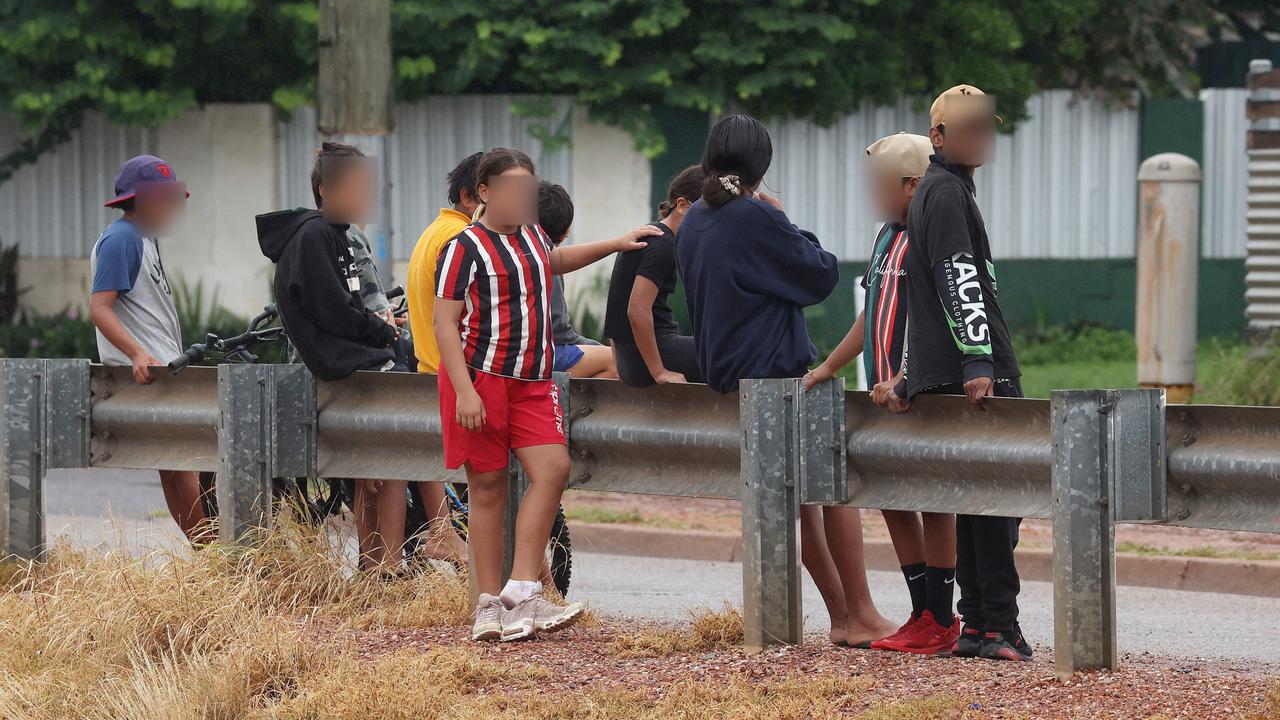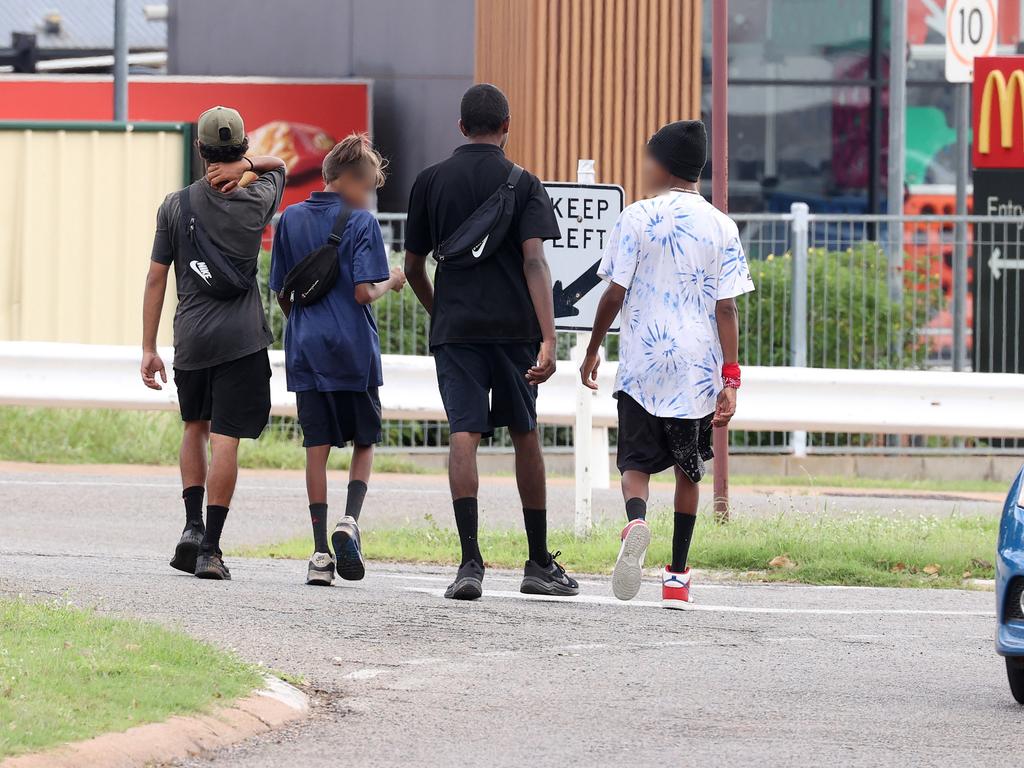Youth crime Qld: Young kids ditching class to roam streets with teen thugs
Children as young as eight are participating in wild crime sprees with older teens, as disturbing data shows a link between what’s going on in schools and local crime levels. SEE YOUR AREA
QLD News
Don't miss out on the headlines from QLD News. Followed categories will be added to My News.
Children as young as eight are participating in wild crime sprees with older teens, as disturbing data show areas with low school attendance have higher levels of criminal offending.
The data, analysed by The Courier-Mail, reveals for the first time the correlation between school attendance and youth crime – with hot spots Cairns, Townsville, Mount Isa and Cape York having shockingly low class attendance rates and high levels of property crime and car theft.
The trend highlights what experts say is an “undeniable” link between crime and school attendance, as the state government grapples to bring youth crime under control.
It comes as Queensland’s top regional police officer has also revealed police are interacting with thousands of children on the street, including many who have stopped going to school because of embarrassment and shame due to a lack of basic health care.
Police sources told The Courier-Mail a trend of kids under the age of criminal responsibility committing car thefts, break-ins and other property crime was emerging.

“Younger kids are starting to ride with older kids, it’s becoming more prevalent,” a police source said.
“We’ve got eight, nine, 10- year-olds starting to engage in crime, and there’s nothing the police can do.
“We know a lot of kids, and are aware that a lot of the kids involved in crime aren’t engaged in education and we are seeing a correlation.
“Police just have to sit back and wait until they get so out of control … and start committing offences.”
According to Queensland Police data, Cairns division recorded almost 900 car thefts in the 12 months between May last year and April this year – the highest in the state – and more than 70 per cent of unlawful use offences were committed by kids.
Cairns West State School, located within this division, recorded a 72 per cent attendance rate – more than 10 per cent lower than the Queensland average.
In Townsville, a 67 per cent attendance rate was recorded at Vincent State School, a public primary school located in the crime-riddled division of Kirwan where more than 400 cars were stolen in the same period.
Across Townsville, kids committed 72 per cent of all car thefts in 2022.
It was a similar story in the outback city of Mount Isa, where Mount Isa Central State School recorded a 75 per cent attendance rate while juveniles committed 83 per cent of car thefts in the region last year.
But shockingly, remote Indigenous communities recorded devastating attendance rates.
Aurukun State School recorded an attendance rate of just 34 per cent while 71 per cent of car thefts in the community were being committed by juveniles.

Doomadgee State School attendance was 36 per cent, while 65 per cent of all car thefts were committed by kids.
While the number of offences in these smaller communities was much lower in comparison, the rate of crime per population was extreme, with Aurukun LGA recording a car theft rate of almost 60 car thefts per 1000 people.
Griffith University criminologist Ross Homel said many vulnerable children in these crime-riddled communities went straight to the bottom of the class, and weren’t helped back up.
“Those children from those communities will begin school behind the developmental standards that are average across Queensland, and those gaps get wider as they get through the school system,” Professor Homel said.
“The kids themselves have neurodivergent disorders, they lack self control, lose their temper, lash out, and don’t have the skills to solve problems.
“The school system is not fit for purpose, it’s not fitting the needs of children in 21st century Australia and particularly those from highly disadvantaged communities.”
Professor Homel said public schools educating the most vulnerable and damaged kids of the state had their funding increased at one third of the rate of private schools.
He said teachers couldn’t solve all the problems on their own, and communities needed more support from the government instead of “service bombs”.
“There’s still not enough resources, we need a lot more effort from all sectors of the government and the communities to ensure we get these problems addressed.
Queensland Police have a number of initiatives they lead, in conjunction with other agencies, which target kids in this age demographic. These include Youth Co-Responder.
Since the program was rolled out in 2020, there had been more than 60,000 interactions with kids out on the street in Queensland.
Regional Operations Acting Deputy Commissioner Mark Wheeler said primary school-aged kids were among them.
“We do see young kids under the age 10 being out and about, and as a parent you question how could they not know where they are either unsupervised, or with others who are not responsible for them,” he said.
Mr Wheeler said many children police meet had learning problems and health conditions that went undiagnosed for years.
One child in Townsville who had undiagnosed eyesight problems stopped going to school because he was embarrassed he couldn’t read the whiteboard, and started running with the wrong group.
“He felt shameful, disengaged with education, but once that person was given assistance they felt confident enough to go to school again,” Mr Wheeler said.
He said early intervention was the key to stopping youth crime.
“We can’t arrest our way out of these issues.”
Former Carpentaria Shire mayor Fred Pascoe said the low attendance was a sad reality of many of the schools in the state’s north, but there was also a huge problem with high suspension rates. “It’s a big problem. Kids have tweaked on to the fact that all they have to do is run amok in class and get a three-day fishing holiday,” Mr Pascoe, Gulf Regional Economic Aboriginal Trust chairman, said.
Forensic psychologist Robert Walkley, a former superintendent at Cleveland Youth Detention Centre, said many of these children came from households of violence and abuse and had no motivation to learn.
Dr Walkley said schools had to be transactional for the child and not be seen as a means to an end.
“Then if nothing gets reinforced at home, there’s no motivation to learn, the school stops being rewarding. They go to the bottom of the class and look for respect elsewhere.”
Dr Walkley said without a home environment to stimulate and encourage educational prospects, many youths would turn to their peer group for guidance, ultimately being led down the path to crime.
Opposition spokesman for police Dale Last said the community was paying the price of this through youth crime.
“There is an undeniable link between school attendance and youth crime. Studies have proven that children who attend school are less likely to be involved in offending and the government itself has acknowledged this,” he said.
The Department of Education said it had a number of programs in place to try and engage children in school, as well as notifying parents when a child didn’t show up.
In a statement a spokesman said: “The department works closely with other government agencies, non-government organisations and communities to support students and families who need extra support.” He said the department was investing more funding into this sector.
Originally published as Youth crime Qld: Young kids ditching class to roam streets with teen thugs



